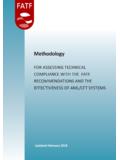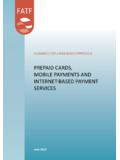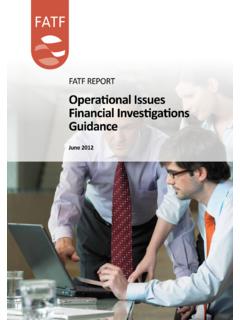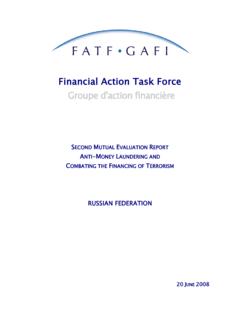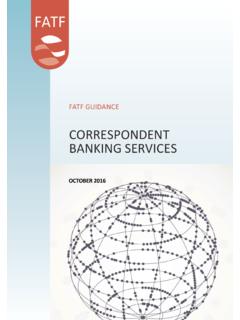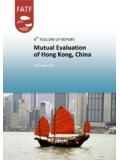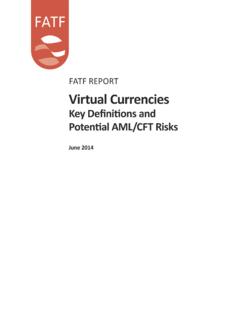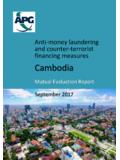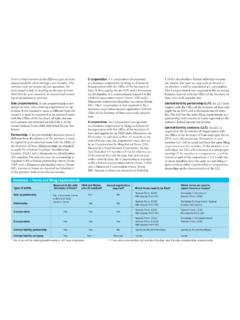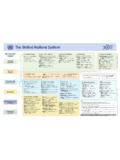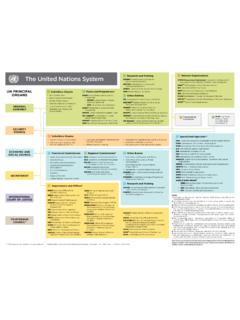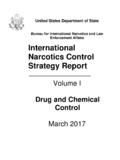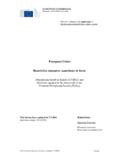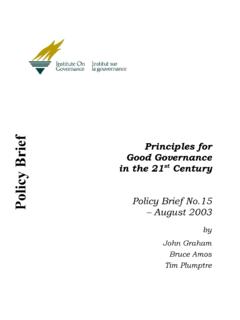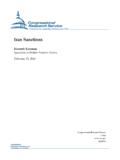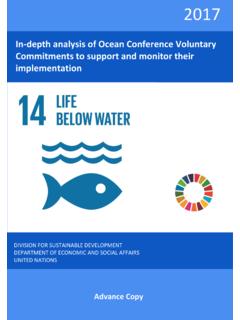Transcription of targeted financial sanctions related to terrorism …
1 International best practices targeted financial sanctions related to terrorism and terrorist financing (recommendation 6). June 2013. financial ACTION TASK FORCE. The financial Action Task Force (FATF) is an independent inter-governmental body that develops and promotes policies to protect the global financial system against money laundering, terrorist financing and the financing of proliferation of weapons of mass destruction. The FATF Recommendations are recognised as the global anti-money laundering (AML) and counter-terrorist financing (CFT) standard. For more information about the FATF, please visit the website: 2013 FATF/OECD. All rights reserved. No reproduction or translation of this publication may be made without prior written permission. Applications for such permission, for all or part of this publication, should be made to the FATF Secretariat, 2 rue Andr Pascal 75775 Paris Cedex 16, France (fax: +33 1 44 30 61 37 or e-mail: INTERNATIONAL BEST PRACTICES.)
2 targeted financial sanctions related TO terrorism AND TERRORIST FINANCING (RECOMMENDATION 6). CONTENTS. ACRONYMS .. 2. Importance of an effective freezing regime .. 4. I. CLEAR AUTHORITIES AND PROCEDURES FOR IDENTIFYING AND DESIGNATING PERSONS. OR ENTITIES .. 5. A. Designations of persons and entities .. 5. B. Judicial or administrative measures not conditional upon the existence of criminal proceedings .. 5. C. Evidentiary standards: reasonable grounds or 6. D. Identifying 6. E. Authorities to identify, designate and sanction .. 7. F. Identifying targets for designation .. 8. G. Use of intelligence and closed source material .. 8. H. Meaning of without delay in the context of designations .. 9. II. DUE PROCESS: REVIEW, DE-LISTING AND UNFREEZING ..10. A. Notice of designation under resolution B.
3 Review of designation, delisting and III. POST-DESIGNATION ISSUES: FREEZING AND PROHIBITING DEALING IN FUNDS OR OTHER. ASSETS OF DESIGNATED PERSONS AND A. Scope of funds or other assets that are subject to freezing B. Freezing funds or other assets without delay on designation ..13. C. Communication strategy ..13. D. Post-freezing reporting and investigation ..15. IV. DESIGNATED PERSONS AND ENTITIES: COMPLIANCE AND ACCESS TO FROZEN FUNDS OR. OTHER ASSETS ..17. A. Resident designated persons and entities ..17. B. Clear domestic authorities and procedures to license the use of or dealing with frozen funds or other assets or the making of funds or other assets available to designated persons or entities ..17. 2013 1. INTERNATIONAL BEST PRACTICES. targeted financial sanctions related TO terrorism AND TERRORIST FINANCING (RECOMMENDATION 6).
4 ACRONYMS. DNFBP Designated Non- financial Businesses and Profession FIU financial Intelligence Unit INR6 Interpretive Note to Recommendation 6. NPO Non-Profit Organization STR Suspicious Transaction Report UNSCR United Nations Security Council Resolution 2 2013. INTERNATIONAL BEST PRACTICES. targeted financial sanctions related TO terrorism AND TERRORIST FINANCING (RECOMMENDATION 6). INTERNATIONAL BEST PRACTICES: targeted financial SANCTION. related TO terrorism AND TERRORIST FINANCING. (RECOMMENDATION 6). INTRODUCTION. 1. Recommendation 6 requires each country1 to implement the targeted financial sanctions regimes to comply with the United Nations Security Council resolutions (UNSCRs or resolutions). relating to the prevention and suppression of terrorism and terrorist financing.
5 Recommendation 6. is intended to assist countries in implementing the targeted financial sanctions2 contained in the UNSCRs relating to the prevention and suppression of terrorism and terrorist financing (i) UNSCR. 1267(1999) and its successor resolutions (the Al-Qaida/Taliban sanctions regimes); (ii) UNSCR. 1373(2001); and (iii) any future UNSCRs which impose targeted financial sanctions in the terrorist financing context. These resolutions require countries to freeze, without delay, the funds or other assets of, and to ensure that no funds or other assets are made available, directly or indirectly, to or for the benefit of, any person or entity either (i) designated3 by, or under the authority of, the United Nations Security Council (the Security Council) under Chapter VII of the Charter of the United Nations, including in accordance with the Al-Qaida/Taliban sanctions regimes4; or (ii) designated by that country or by a supra-national jurisdiction pursuant to UNSCR 1373.
6 Such measures may be either judicial or administrative in nature. 1 All references to country or countries apply equally to territories or jurisdictions. 2 The term targeted financial sanctions means both asset freezing and prohibitions to prevent funds or other assets from being made available, directly or indirectly, for the benefit of designated persons and entities. 3 The term designated person or entity refers to: (i) for the Al-Qaida/Taliban sanctions regimes, (a). individual, groups, undertakings and entities designated by the Committee of the Security Council established pursuant to resolutions 1267(1999) and 1989(2011) (the 1267 Committee), as being individuals associated with Al-Qaida, or entities and other groups and undertakings associated with Al- Qaida (the Al-Qaida (1267/1989) sanctions regime), and (b) individuals, groups, undertakings and entities designated as the Taliban prior to the date of adoption of resolution 1988(2011), as well as other individuals, groups, undertakings and entities designated by the Committee of the Security Council established pursuant to resolution 1988(2011) (the 1988 Committee)
7 , as being associated with the Taliban in constituting a threat to the peace, stability and security of Afghanistan (the 1988. sanctions regime); and (ii) for resolution 1373(2001), any natural or legal person or entity designated by countries or a supra-national jurisdiction pursuant to resolution 1373(2001). 4 Recommendation 6 is applicable to all current and future successor resolutions to resolution 1267(1999), namely, those resolutions implementing the Al-Qaida (1267/1989) sanctions regime and those resolutions implementing the 1988 sanctions regime, and any future UNSCRs which impose targeted financial sanctions in the terrorist financing context. At the time of issuance of this best practices paper (June 2013), and in view of the split of the Al-Qaida/Taliban sanctions regime on 17.
8 June 2011, the successor resolutions to resolution 1267 (1999) are: resolutions 1333(2000), 1363(2001), 1390(2002), 1452(2002), 1455(2003), 1526(2004), 1617(2005), 1735(2006), 1822(2008), 1904(2009), 1989(2011) and 2083 (2012), and all current and future successor resolutions to resolution 1988 (2011), including resolution 1730 (2006) and 2082 (2012). 2013 3. INTERNATIONAL BEST PRACTICES. targeted financial sanctions related TO terrorism AND TERRORIST FINANCING (RECOMMENDATION 6). 2. The required elements of a targeted financial sanctions regime are identified in Recommendation 6 and its Interpretive Note (INR6). While Recommendation 6 will be assessed in the FATF mutual evaluation and assessment process, this paper, which supersedes the existing Best Practices Paper of October 2003, as revised in June 2009, sets out non-binding guidance based on updates in relevant UNSCRs and in response to challenges faced by countries in the implementation of the requirements of Recommendation 6.
9 3. Efforts to combat terrorist financing are greatly undermined if countries do not freeze the funds or other assets of designated persons5 and entities quickly and effectively. Nevertheless, in determining the limits of or fostering widespread support for an effective counter-terrorist financing regime, countries must respect human rights, respect the rule of law, allow due process, recognise and protect the rights of bona fide third parties. This Paper seeks to assist countries in developing and implementing targeted financial sanctions to prevent and suppress terrorist financing in accordance with the relevant UNSCRs and in a manner consistent with these fundamental principles, through a robust and transparent targeted financial sanctions regime. IMPORTANCE OF AN EFFECTIVE FREEZING REGIME.
10 4. Effective freezing regimes are critical to combating the financing of terrorism and, as a preventive tool, accomplish much more than freezing terrorist- related funds or other assets present at any particular time. Effective freezing regimes also combat terrorism by: a) Deterring non-designated persons or entities who might otherwise be willing to finance terrorist activity. b) Exposing terrorist financing money trails that may generate leads to previously unknown terrorist cells and financiers. c) Dismantling terrorist financing networks by encouraging designated persons or entities to disassociate themselves from terrorist activity and renounce their affiliation with terrorist groups. d) Terminating terrorist cash flows by shutting down the pipelines used to move terrorist related funds or other assets.

